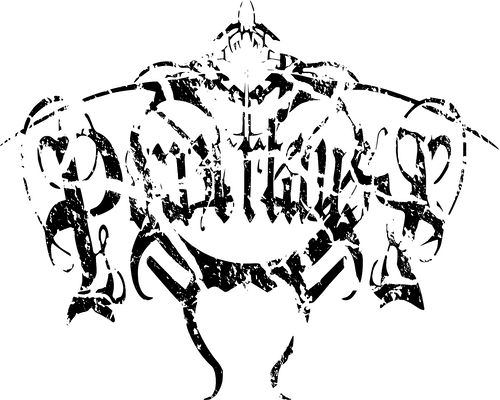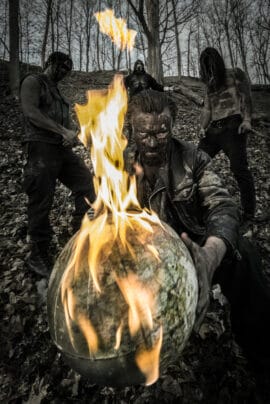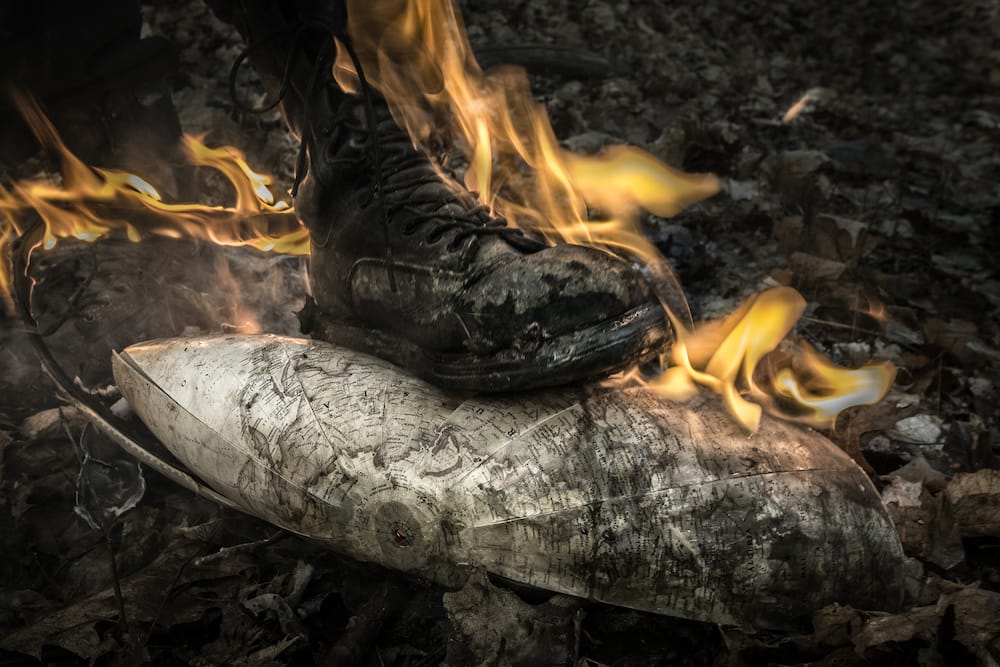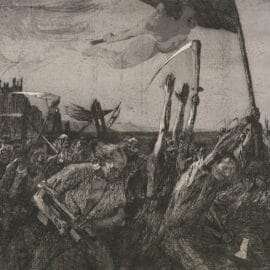After the shockingly brute first part of their album series „The Suns Of Perdition“, Canadian black metallers PANZERFAUST have released „Chapter II: Render Unto Eden“, a more subtle and atmospheric album that addresses all kinds of interesting topics. We took the occasion of the record’s release to ask guitarist Brock Van Dijk a few questions – a conversation about the parallels between the band’s songwriting and the writing of a series of novels, religious cherry-picking, right-wing extremism in black metal and faith in the good in people.

How are you doing these days? How are you as a band coping with the restrictions under the corona pandemic?
It is my pleasure. I’m doing well, thank you. We have just finished all of the instrumentals for the third instalment of „The Suns Of Perdition“ series. The pandemic has not slowed us down at all. Fortunately, for better or worse, we have taken upon an ambitious burden that is keeping us more than occupied in these tumultuous times.
Your music is often compared to polish black metal from the likes of, for example, Mgła. Does it bother you if your art is not considered entirely on its own?
This doesn’t bother me at all. Some might say that there are comparisons with the Polish black metal sound whereas people have made comparisons to genres that don’t necessarily find themselves within the black metal framework. All that aside, I have tremendous respect for what Mgła has accomplished. From what I have read in the lyrics, I can tell that M. (of Mgła) has many of the same literary influences. I would love to have a conversation about some of these ideas. Some day.
 With „The Suns Of Perdition – Chapter II: Render Unto Eden“ you have released the second part of your planned tetralogy. How did you approach this four-part album cycle? Did you start working on the four records simultaneously or are you creating one after the other?
With „The Suns Of Perdition – Chapter II: Render Unto Eden“ you have released the second part of your planned tetralogy. How did you approach this four-part album cycle? Did you start working on the four records simultaneously or are you creating one after the other?
To some extent, it is both of the avenues which you have alluded to. Simply put, I have had a tremendous amount of material I have been harbouring over the course of the last 10 years. Coupled with this, PANZERFAUST now has a new lineup, namely the rhythm section. This has allowed the apparatus to really generate a lot of material that has been sitting in my subconscious. I approached this four-part album in the same way one might approach a multi-volume novel: There are elements in each chapter that come from an a priori position, however, the bulk of the material is written organically from the War Room.
Your new album seems to have received very good reviews and also to have sold well. Did you expect that you would be so successful with the record?
By no means do I want to sound self-congratulating, but all I can say is that we felt more confident about this recent album than we ever had in the past.
Judging from the songtitles, on „Render Unto Eden“ you deal more with religious and philosophical topics than on the first part „War, Horrid War“. What is the common thread between the lyrical themes of the new songs?
I’ve always found myself drawn to writing about the extremes of the human experience. Be it historical, philosophical or personal. Whereas „Suns I“ details more of the historical, „Suns II“ explores the philosophical. Not to give too much away, but you may be able to take from this the direction that „Suns III“ may be heading.
There are all kinds of references in the album that many people are certainly unfamiliar with – for example on „Pascal’s Wager“, which references Blaise Pascal’s controversial argument for belief in God. How do you yourself become aware of such things?
I have immersed myself in literature since I started the band. I was 14 at that time and just beginning to read the foundational works of Western philosophy and the history of conflict over the past century. These things have resonated with me for my entire life since. In a world that is becoming almost entirely dominated by the visual, I am proud to say that I still read books. There is no such thing as ever learning enough.
In your lyrics you often show yourself to be very straightforwardly anti-religious. In a world that is becoming more and more secular, however, many people no longer deem religion to be important. Why do you still feel compelled to address it?
What you say is true about the world becoming ever more secular in the classical sense. However, as the churches of the world are ever more emptied, that psychological void, or the religious instinct is instead filled by other means. Sometimes it manifests itself politically or in a social justice sense. Increasingly I have found it taking form in a kind of cafeteria style religious approach wherein people pick and choose elements of different forms of faith they find appealing to their own constitutions. It just goes to show, the religious person always has been, and always will be fundamentally at odds with themselves.

Especially on „War, Horrid War“ you dealt with the topic of war in a very harrowing, unembellished way. Do you think that other metal bands often glorify such things too much by singing about alleged heroic deeds?
There is, of course, an element of war that does lend itself to heroism and valor. On the inverse, and what I consider to be the more profound is the abject terror of it. “War, Horrid War” aims to explore this in an unfettered, apolitical and genuine way.
In your lyrics you often draw pictures of an endless cycle of human cruelty. Is the belief in the good in humans from your point of view nothing but a misconception?
I don’t think the benign component of human nature is without merit. If we are all honest, I think we can all concede that there is, in fact, an innate goodness to some aspect of humanity. But of course, there is on the contrary, what Freud described as destrudo. The will to do evil; the will to dominate.
Because of your band name and your self-portrayal, some worried in the past that you might hold right-wing extremist views, which you denied while referring to your lyrics. However, there are many bands that purposefully wrap their radical ideology in a cloak of ambiguity. In your opinion, how can listeners distinguish with certainty bands that are endorsing extremism from those that are just depicting and thereby even opposing it?
I understand the krux of your question. There are certainly bands that do enshroud views of this kind – some quite convincingly – in mysticism or ambiguity. PANZERFAUST is not, and has never been that band. I would say that listeners have to make up their own minds about the material that they are consuming. Personally, I can only speak for myself and to some extent, my bandmates when I say that the idea of fascism is antithetical to us, as freedom of expression is of utmost importance to us. We defend the individual to have his or her opinion be spoken, and more importantly, to be heard. My own opinion is good enough for me, and I will defend it against any mob, or moral majority at any time and at any place. If someone doesn’t like it, they can take a number, get in line, and kiss my ass.
Let’s talk a little bit more about „Render Unto Eden“. The new record sounds a bit less brutal and more atmospheric than „War, Horrid War“. Was this stylistic change a conscious decision with regard to the content of the songs?
It was definitely a conscious change. It was one of the main reasons that “The Suns Of Perdition” was structured this way. From the beginning, we had a very broad musical approach, and to some extent it would simply be indigestible for us to be mixing the material from their appropriate chapters. Ultimately, I think the point is much better made when it can be compartmentalized in this way.
Do you personally prefer your more brute or your more atmospheric songs? Or do you not make any difference at all there?
I suppose it all depends how I am feeling. There is a time for war, and there is a time for self-reflection.
Maria „Masha“ Arkhipova of Arkona contributed guest vocals to the track „Promethean Fire“. Why did you want to have her voice in particular in this specific track?
Masha is a dear friend of mine. We have a special musical connection. When writing „Promethean Fire“, it came to me that it was integral to have her sing on the conclusion of this song. It still sends chills up my spine listening to it to this day. It was a tremendous honour to have her be a part of this song.
 As far as I know, the picture on the cover is called „Aufstand“ by German artist Käthe Kollwitz. How did you come across it and why do you think it is a suitable visualization of the album?
As far as I know, the picture on the cover is called „Aufstand“ by German artist Käthe Kollwitz. How did you come across it and why do you think it is a suitable visualization of the album?
There was a featured exhibit of Kathe Kollwitz’s work here in Toronto at the Art Gallery of Ontario. It was here where I first became familiarized with her work. This particular piece I became enthralled by because it so well mirrored our times, and the themes which I chose to write about on „Suns II“.
Can you already give us some first hints as to what the fans can expect from the third part of the tetralogy?
Something that – for better or worse – that is well thought out.
At the end of the interview I would like to go through a short brainstorming with you. What comes to your mind with the following terms?
Post-rock: Never listened to it.
Black Lives Matter: An undeniable sentiment, albeit sometimes poorly defended.
Pacifism: “The sleep of reason brings forth monsters.”
Darkthrone’s “Panzerfaust“: Never quite understood the correlation between the music and the title.
Quarantine: Life sucks and then you die.
Dieses Interview wurde per E-Mail geführt.
Zur besseren Lesbarkeit wurden Smilies ersetzt.
